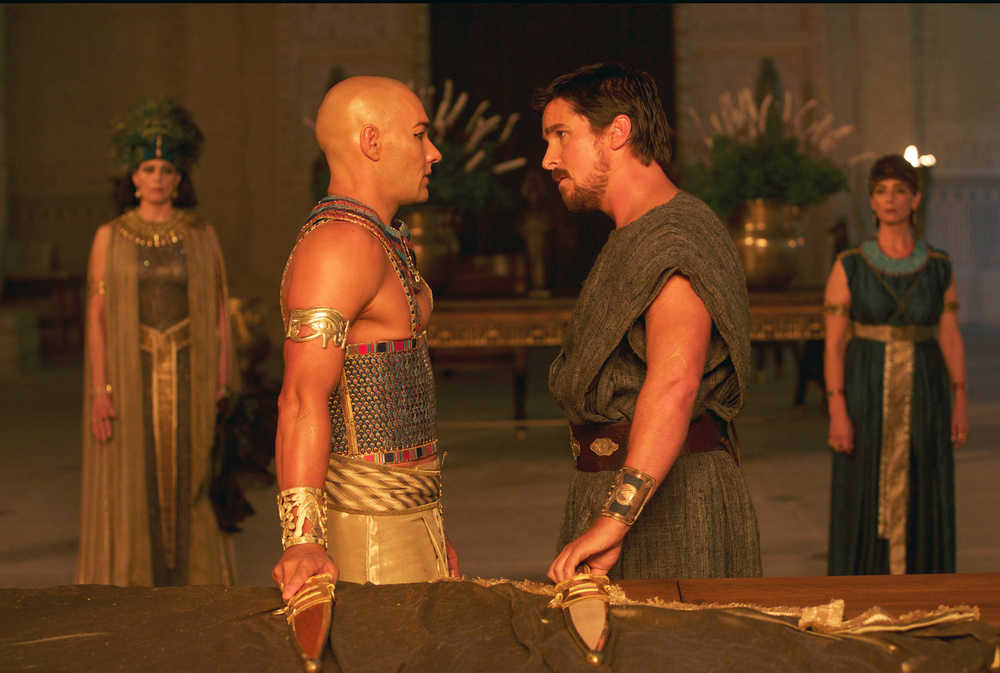“Exodus: Gods and Kings”
Twentieth Century Fox
2 hours, 30 minutes
In the 1950s only white people were allowed to appear in movies, and only Charlton Heston was allowed to represent the Bible. As a result, all religious epics, despite taking place almost exclusively in the Middle East and Africa, were cast with entirely white, mostly British and American, actors. This helped perpetuate the idea that Jesus, his followers, and everyone else in the Ancient world were actually anglo-Europeans.
While there are a few people who still believe this, today we know that people from the Middle East are Middle Eastern, that people from Egypt are, in fact, African, and that people from other races can, much to the surprise of Hollywood, act.
Ridley Scott’s epic retelling of Moses and the liberation of the Hebrews in ancient Egypt is certainly not a bad film. In fact, despite its problems, it is very effective, is full of both moving and thrilling moments, and does a much better job than the previous Biblical epic, “Noah,” of recounting a beloved traditional tale. In many ways, it represents old-school, big-budget movie-making with a cast of thousands, amazing sets and locations, and grand-scale story telling.
But along with the massive scope comes the bombastic, melodramatic dialogue, over acting, and the unfortunately white-washed cast.
Eschewing the early scenes of Moses’ birth, his basket ride down the Nile, and his childhood, “Exodus” begins with Prince Moses and his best pal Ramses, son of the Pharaoh, preparing to make war on the Hittites. Following the battle, Ramses, rattled after a near-death experience, allows Moses to go in his stead to inspect the slave community and to find out if their overseer has been stealing money. When he arrives, Moses is confronted by an elder Hebrew leader who informs him that he is not Egyptian as he had been led to believe, but, in fact, Hebrew.
This, obviously leads to trouble, and eventually Moses finds himself exiled, living a new life as a shepherd many miles away. He’s content, until, that is, God decides to use him to try and get Ramses, now Pharaoh, to listen to reason and set the Hebrews free. Anyone who’s been to Sunday school or watched late-night on Turner Classic Movies knows how well that turns out.
Scott, in many ways, sticks to the straight and narrow with this story, deviating from the expected elements hardly at all. However, one aspect he opts to “make his own” is the appearance of God. In Cecil B. DeMille’s version, God was a burning bush and a disembodied booming voice. “Exodus” has the bush, but this time around God comes in the form of a 10-year-old boy and his discussions with Moses are decidedly two-sided.
It might seem jarring to people of other generations, but echoing today’s humanist rational attitude, God isn’t necessarily omnipotent and Moses is not humbled. This didn’t bother me, but I can bet my grandmother would have been incensed.
As far as the spectacle goes, Scott hits it out of the park. The plagues are massive and harrowing and the parting of the Red Sea is as impressive as it should be, though somewhat different than what we’ve seen before.
The plot feels a tad rushed, as though the screenwriters figured that we all knew was coming and that they needed to hurry up and get to the good stuff. The biggest problem, however, is the casting. I can’t say that any of the actors do a particularly bad job, but they just seem completely out of place.
The Scottish, British and Australian accents and obviously bronzed skin on the “Egyptians” just feels wrong, and pointless. Sigourney Weaver has maybe two lines and maybe a minute of screentime and still sticks out like a sore thumb. Christian Bale didn’t bother me as much as the others, and I understand the financial justification for hiring a big-name actor for a film of this scale, but were there no Middle Eastern or black actors to fill out the rest of these roles?
I know there are — there are plenty of them in this movie, though none of them are ever allowed to speak. It’s pretty egregious. Making a modern comparison, having Australian Joel Edgerton, who I like a lot, play Ramses is like having Brad Pitt play Malcolm X. Ridley Scott is a great filmmaker and despite crafting an exciting, entertaining tale, he has a responsibility to do better by his actors, his audience, and history.
Grade: B-
“Exodus: Goda and Kings” is rated PG-13 for some fairly gruesome violence including scary crocodile attacks.
Chris Jenness is a freelance graphic designer, artist and movie buff who lives in Nikiski.

